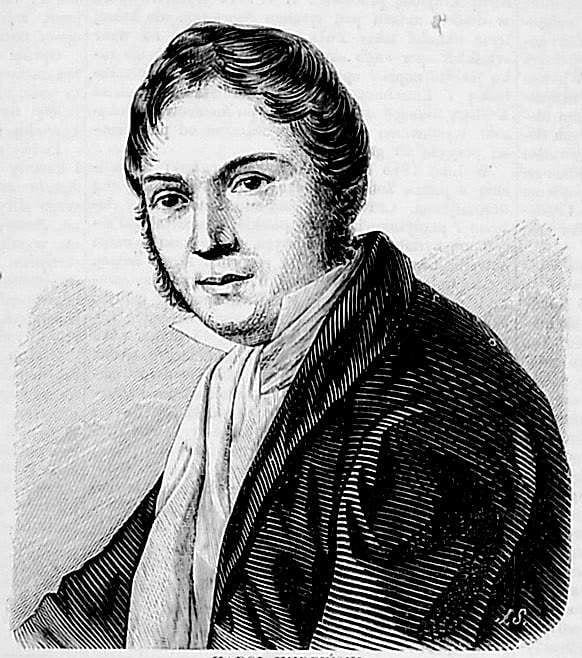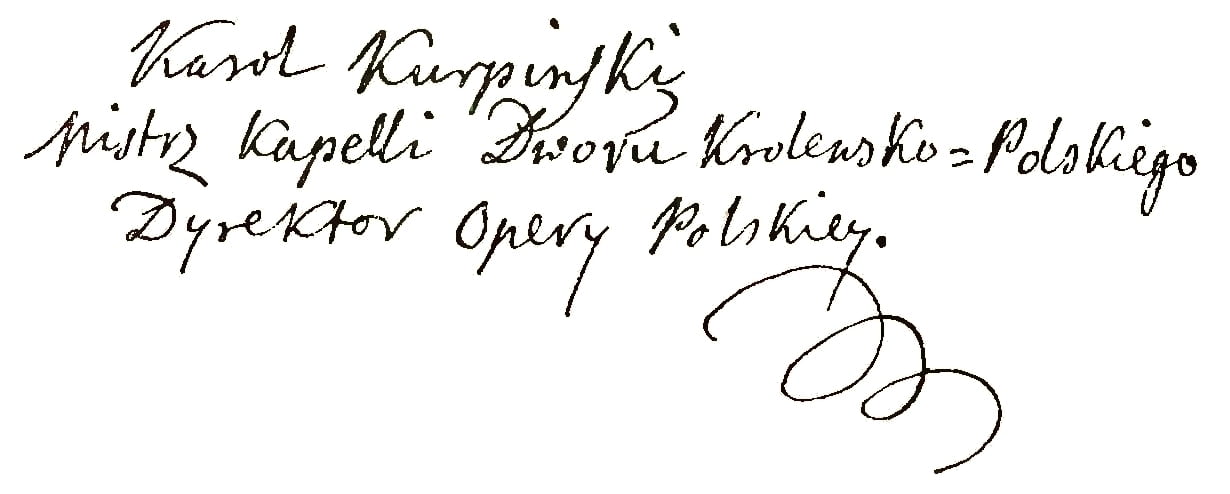6 March 1785, Włoszakowice — 18 September 1857, Warsaw
Biography

Born in Włoszakowice in western Poland, Karol Kazimierz Kurpiński, was a composer, conductor and teacher. He first studied music with his father, Marcin Kurpiński (1744-1803), an organist at Włoszakowice. At the age of 12, he became organist at Sarnow, where his uncle, Karol Wański, was a parish priest. In 1800 another of his mother’s brothers, the cellist Roch Wański, took him to the estate of Feliks Polanowski, an amateur composer who had a private orchestra of which Wański was a member, and in which the young Kurpiński played second violin. It was probably at this time (before 1808) that he composed his first opera, Pygmalion, now lost.
In 1808 Kurpiński became resident music master to the Rastawiecki family in Lwów, and in 1810 settled in Warsaw. With the help of Elsner he became a deputy conductor and, from 1824, principal conductor of the Warsaw Opera, a position he held until 1840. He taught music at the schools of drama (1812 and 1817) and singing (1835-40) which he himself had founded. In 1815 Kurpiński became a member of the Warsaw Society of Friends of Learning, and was also a member of many musical societies in Poland and abroad, including the Societe des Enfans d’Apollon in Paris. He became Kapellmeister of the Polish royal chapel in 1819 and in the same year received a medal for his services to music. In 1820-21 he founded and edited the first Polish music periodical, Music weekly. Kurpiński was decorated with the Order of St Stanisław in 1823, when he also travelled to Germany, France, Italy and Austria on a musical tour. He was married to Zofia Brzozowska (1799-1879), a singer in the Warsaw Opera.

Kurpiński was one of the most talented Polish composers before Chopin. He helped to lay the foundations of a national style and prepared the ground for Polish music of the Romantic period. Gifted with exceptional creative originality, he contributed to the development of Polish opera, introducing new musical devices and achieving an intensified dramatic expression. Operas and polonaises form the largest part of his output. His stage compositions were successful at the time and some, like The Castle of Czorsztyn, are still popular today. Of his 24 stage works, nine survive complete and eight in part, while the rest have been lost. Although brought up on the Viennese Classics, Kurpiński followed the spirit of his times, combining the new achievements of European music with the folklore of his own country.
In His Own Words
“Day 2, Wednesday [2 April 1823]. We dined with the Liwins; there were eight of us, including three Englishmen, one American, two Poles (Nakwaski and I), one Italian (Morlacchi) and one German (Weber). The dinner was decent; the wines were good. After dinner all of us went to the theatre to see Rossini’s Cinderella. Since the King was there with his entire family, they played the overture; the orchestra was rather small but swift and attentive. The title role was played by a student of Polender, and she made her debut in this opera. She has an even and strong contralto voice that’s pleasant and agile, whilst she is herself quite young but not pretty. Mr. Junk was passable with his voice and condition, but Mme. Miksch was old, ugly and devoid of talent. The role of Baron Montefiore was sung by Benincasson, a superb buffo (I mentioned him with Psalms and Lamentations). Prince Ramiro was sung by tenor Gentili quite well, Dandini was done by a bass (similar to Szczurowski); Zezi was also good. In general the entire opera went very well. By the way, the singers here have to earn their keep. For example on a holy day they have to sing for services and do psalms and in the evening they must sing operas! Accidentally, I was given a seat next to this well-known Ogiński, the composer of beautiful and widely known Polonaises; both he and I were pleased to become acquainted.
After the opera Nakwaski took me out to supper. My eyes sparkled when one, and then another bottle of porter (a really good one) was brought. Since departing from Warsaw I didn’t have a chance to savor it; here there’s no porter to be had, only in this establishment, and only rarely if you know to ask for it. After this porter I slept beautifully.
Day 3, Thursday. I saw King’s apartments, about a mile and a half from Dresden in a village called Pilnitz. It’s a place of comfort and good health. Wherever you look you’ll find variety: little of art but plenty of nature. We climbed a peak of a mountain called Borstberg, from where you could see almost all of Saxony. I saw the invincible fortress of Konigstein and the so-called Swiss Saxony. The mountains are not so huge as those near Kraków, but more elegantly dispersed. As we enjoyed the view, suddenly an icy wind came up and [snow] pellets began to lash our faces. Luckily, I brought my coat with me, since going down was a long trek. I also saw the local royal palace. It’s a spacious building in a Japanese style, replacing the old castle that burned a few years ago. Tired after returning home, I fell sound asleep.
Day 4, Friday, we went with Colonel Liwins to a rehearsal for a concert given by a young man named Benedict, a pupil of Weber. Today he will premiere his composition and make a pianistic debut. It seems like he might become a better composer than pianist. After the concert I experienced a particularly strong attack of melancholy, real throes of it. Maybe because the day was cloudy and cold.
Day 5, Saturday. I began to write a long letter to my Zosia. During my stay in Dresden I received visits from many musicians: oboists, bassists, flutists, etc. etc., asking if they could perhaps find a job in a Warsaw orchestra, and even today I had a few more visits. About noon the Bavarian King came to Dresden; he is the father of a beautiful Princess Amalie Augusta, the wife of Prince Jan. I observed him closely tonight at the theatre, where they played Cimarosa’s old opera, Il Matrimonio segreto. In this opera I saw Mme. Sandrini; she is a pleasant character, lean and small, and in spite of her forty years looks great from the stage. Her little voice had suffered a lot already; yet these are the beautiful ruins and she is quite a good actress as well. Having looked closely at the Italian opera here, I can say that our artists with their better command of the roles could prove superior, with the exception of the most pleasant buffo Benincasson, who really reminded me of our dearly departed Żółkowski. I couldn’t wait for German opera, which is now supposed to be good under the direction of Weber. The Italian opera will in the coming days engage a new, young and beautiful diva and a new tenor, who will make a debut in Rossini’s Riciardo, but I cannot wait for them. I’ve been here too long already.”
[Karol Kazimierz Kurpiński, Travel Diary 1823]
Selected Compositions
Chamber Music
Fantaisie en quatuor
Trio for clarinet, violin and cello
Reverie over Wanda’s tomb for violin and piano (1820)
Nocturn for horn, bassoon and viola, Op.16 (1823)
Paysage Musical for horn and bassoon, Op.18 (1823)
Cavatina for trumpet or trombone and piano
Orchestral Works
Grand Battle Symphony Op 15
Grand Fugue on the Song “Poland has not perished yet” arranged for piano (1821)
Potpourri or Variations on National Themes for piano and orchestra (1822)
Clarinet Concerto [arr.for clarinet and piano]
Sacred Vocal Works
Six Masses including “Country Mass” (182)1
Oratorio for 4 voices, 2 trumpets, 2 trombones, double bass, timpani and organ
Cantata Vocal Works
Cantata on the Anniversary of Napoleon’s Coronation (1810)
Elegy on the Death of Tadeusz Kosciuszko (1819)
Cantata on the Unveiling of the Copernicus Monument (1830)
Songs
The Song of Warsaw (1831)
The Song of the Lithuanian Legionaries (1831)
Piano Music
A Dreadful Dream (1820)
Le reveil de J.J. Rousseau au printemps (1821)
Nine variations (1821)
Fantaisie for alto (1821)
Fantaisie Op 10 (1823)
Six Variations (1823)
Stage Works
Pygmalion (ca 1800-08) [lost]
The Palace of Lucifer opera in 4 acts (1811)
Mistress Marcin of the Harem comic opera in 3 acts (1812)
The Charlatan, or The Raising of the Dead opera in 2 acts (1814)
Jadwiga, Queen of Poland opera in 3 acts (1814)
Superstition, or Krakovians and Mountaineers, or The new Krakovians opera in 3 acts (1816)
Jan Kochanowski at Czarny Las opera comique in 2 acts (1817)
Czaromysl the Slav Prince opera in 1 act (1818)
Terpsichore’s New Colony on the Vistula ballet (1818)
The Castle of Czorsztyn, or Bojomir and Wanda opera in 2 acts (1819)
Kalmora, or The Paternal Right of the Americans melodrama in 2 acts (1820)
Mars and Flora ballet in 1 act (1820)
The Foresters of Kozienice opera in 1 act (1821)
The Three Graces ballet (1822)
Cecylia Piaseczynska opera in 2 acts (1829)
Page updated 23 March 2018